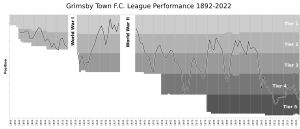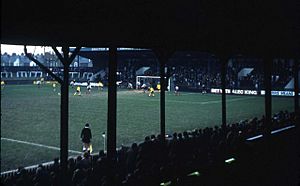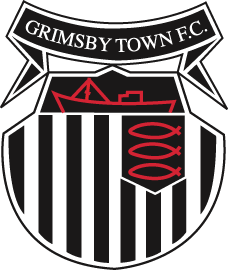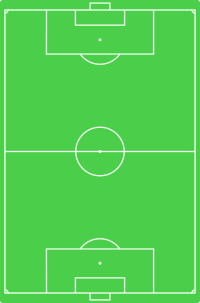Grimsby Town F.C. facts for kids
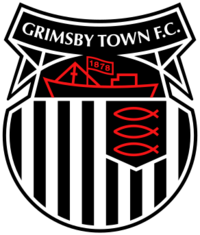 |
||||
| Full name | Grimsby Town Football Club | |||
|---|---|---|---|---|
| Nickname(s) | The Mariners | |||
| Founded | 1878 | |||
| Ground | Blundell Park | |||
| Capacity | 8,550 (all seated) | |||
| Coordinates | 53°34′12″N 0°2′47″W / 53.57000°N 0.04639°W | |||
| Owner(s) | 1878 Partners (63.1%) The Mariners Trust (13.5%) Mike Parker (10.5%) Other Shareholders (12.9%) |
|||
| Chairman | Andrew Pettit | |||
| Manager | David Artell | |||
| League | League Two | |||
| 2018–19 | League Two, 17th of 24 | |||
|
||||
Grimsby Town Football Club is a professional association football team from Cleethorpes, England. They are known as "the Mariners" and play in League Two, which is the fourth level of English football.
The club started in 1878 as Grimsby Pelham Football Club. A year later, they changed their name to Grimsby Town. In 1898, they moved to their current home, Blundell Park. Grimsby Town is the most successful football team in the historic area of Lincolnshire. They are the only club from this area to have played in the top division of English football. They also reached the FA Cup semi-finals twice in the 1930s.
Famous managers include Bill Shankly, who later led Liverpool to many titles. Another was Lawrie McMenemy, who won the FA Cup with Southampton in 1976. Alan Buckley is the club's most successful manager. He helped the team get promoted three times. In the 1997–98 season, they won two trophies at Wembley Stadium. These were the Football League Trophy and the Football League Second Division play-off Final.
Grimsby Town has played in all top five divisions of English football. In 1939, a record 76,962 fans watched their FA Cup semi-final against Wolverhampton Wanderers at Manchester United's Old Trafford stadium. This is still the biggest crowd ever at Old Trafford. In 1954, they were the first English club to hire a foreign manager, Elemér Berkessy from Hungary. The player with the most games for the club is John McDermott, who played 754 times. The top scorer is Pat Glover, with 180 goals.
Contents
- Club History
- Early Years (1878–1918)
- Between the World Wars (1918–1945)
- After World War II (1946–1970)
- The 1970s Revival (1970–1980)
- Back in the Second Division (1980–1987)
- Promotions and Challenges (1987–1997)
- The Double Wembley Season (1997–98)
- Back in the Second Tier (1998–2003)
- Moving Down the Divisions (2004–2010)
- Out of the Football League (2010–2016)
- Back in the Football League (2016–2021)
- Climbing Back to the Football League & New Owners (2021–Present)
- Team Colours and Kits
- Stadium
- Rivalries
- Mascot
- Supporters
- Grimsby Town Women
- Players
- Club Officials
- Managerial History
- Notable Former Players and Managers
- Club Records
- Honours
- See also
Club History
Early Years (1878–1918)
Grimsby Town Football Club began in 1878. A group of people from the local Worsley Cricket Club wanted to form a football team. They wanted something to do during the winter when cricket wasn't played.
The club was first called Grimsby Pelham. This name came from the family name of the Earl of Yarborough, who owned a lot of land nearby. In 1880, the club bought land at Clee Park for their stadium. They moved to Abbey Park in 1889. Then, in 1899, they moved to their current home, Blundell Park. Their first team colours were blue and white hoops. In 1884, they changed to chocolate brown and blue shirts.
In 1888, the club started playing in a league called the 'Combination'. This league soon ended. The next year, they tried to join the Football League but were not accepted. Instead, they joined the Football Alliance. In 1890, the club became a limited company. Finally, in 1892, they joined the Football League when it added a second division. Their first game was a 2–1 win against Northwich Victoria.
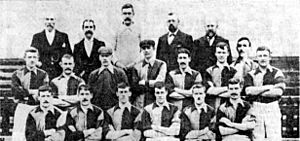
In the 1901–02 season, Grimsby Town won their division and were promoted to the First Division. Two seasons later, they were relegated. By 1910, they were out of the Football League and playing in the Midland League. However, they won that league in their first try. They then rejoined the Football League, taking the place of local rivals Lincoln City.
Grimsby Town and Hull City were the only professional teams allowed to play league football on Christmas Day. This was because of the local fishing industry. This tradition has now stopped.
Between the World Wars (1918–1945)
This time was the most successful for the club. After World War I, the club was relegated to the new Third Division. By 1929, they were back in Division One. They stayed there, except for a short break from 1932 to 1934, until 1939. Their highest-ever league position was 5th in Division One, in the 1934–35 season. In 1925, they started wearing their famous black and white stripes.
Three Grimsby Town players, Jackie Bestall, George Tweedy, and Harry Betmead, played for the England national team between 1935 and 1937. They are still the only players from the club to have played for the full England team.
Grimsby reached the FA Cup semi-final in 1936. They lost 1–0 to Arsenal. On February 20, 1937, a record 31,651 fans watched Grimsby play Wolverhampton Wanderers in the FA Cup.
They reached the FA Cup semi-final again on March 25, 1939, playing Wolverhampton Wanderers at Old Trafford. The crowd of 76,962 is still the largest ever at Old Trafford. Grimsby lost 5–0. Their goalkeeper, George Moulson, was injured early in the game. Back then, teams could not use substitutes for injuries. So, Grimsby had to play with 10 men and a player who wasn't a goalkeeper in goal.
After World War II (1946–1970)
After World War II, the Football League started again for the 1946–47 season. Grimsby was relegated at the end of the 1947–48 season. They have not returned to the top level since. Most of the 1950s and 1960s were spent moving between the Second and Third Divisions. From 1951 to 1953, Bill Shankly managed the team. He later became a very famous manager for Liverpool.
In 1968, Grimsby dropped into the Fourth Division for the first time. The next season, they finished near the bottom and had to ask to stay in the league. This season also saw the lowest-ever attendance for a Football League match at Blundell Park: only 1,833 people watched them lose 2–0 to Brentford.
The 1970s Revival (1970–1980)
In 1972, Grimsby Town paid a record £20,000 to sign Phil Hubbard. That same year, 22,489 fans watched them win at home against Exeter City. This win helped the club get promoted as Division Four Champions. This success was thanks to the new manager, Lawrie McMenemy.
The club stayed in Division Three until they were relegated in 1977. But they were promoted again in 1979. A year later, they became Third Division Champions under manager George Kerr. They returned to the second level of English football after 16 years.
There's a story that in 1976, the local Member of Parliament, Anthony Crosland, invited the US Secretary of State, Henry Kissinger, to watch Grimsby play. While Kissinger didn't actually watch the game, Crosland did arrange a meeting at a nearby air base. He wanted to stay in his local area to watch his team play.
Back in the Second Division (1980–1987)
In their first season back (1980–81), the club finished 7th. Work began on a new £1 million stand, now called the Young's Stand. It opened on August 29, 1982, when Grimsby played Leeds United. In the 1983–84 season, the club finished 5th in the Second Division. This was their highest league finish since the 1947–48 season. Grimsby Town's time in the Second Division ended in 1987. They had a tough run of games at the end of the season, which led to their relegation.
Promotions and Challenges (1987–1997)
The 1987–88 season saw Grimsby Town relegated for a second year in a row, putting them in the Fourth Division. The club also had serious money problems. As the 1988–89 season started, Grimsby had to avoid falling out of the Football League completely. They managed to do this, finishing 9th.
Alan Buckley became manager after the 1988 relegation. By 1991, he had led the club to two promotions in a row. Grimsby stayed in the second tier of football for six years. Players like Shaun Cunnington, Keith Alexander, Paul Groves, and Clive Mendonca made the club a strong team. In 1992–93, Grimsby finished 9th in the new Division One. They were even close to a play-off spot for promotion to the Premier League.
The Mariners also started to develop talented young players from their own youth academy. These included Jack Lester, John Oster, and Gary Croft. Buckley left Grimsby in 1994. He was replaced by defender Brian Laws. Laws guided Grimsby to a 10th-place finish in his first season. In the 1996–97 season, the Mariners were relegated from Division One.
The Double Wembley Season (1997–98)
Subs:
1998 Football League Trophy Final starting line-up at Wembley Stadium.
The 1997–98 season was Grimsby Town's most successful season after the war. Alan Buckley returned as manager. He brought in key players like Paul Groves, Kevin Donovan, and David Smith. The team started slowly but then played much better. They ended up in 3rd place, fighting for promotion.
Grimsby had a great run in the League Cup. They beat Premier League teams like Leicester City and Sheffield Wednesday. They finally lost to Liverpool. Young players like Daryl Clare and Jack Lester also started to shine.
The Mariners then beat Burnley in the Football League Trophy Northern final. This meant the club would play at Wembley Stadium for the first time. They played AFC Bournemouth in the final. The game went to extra time, and Wayne Burnett scored a "golden goal" in the 112th minute to win the trophy. This was the club's first major trophy.
Just four weeks later, Grimsby returned to Wembley. This time, they faced Northampton Town in the Division Two play-off Final. Grimsby won 1–0 with a goal from Kevin Donovan. This gave the club a historic "Wembley double" and promotion back to Division One.
Back in the Second Tier (1998–2003)
The 1998–99 season saw Grimsby Town finish 11th. However, the 1999–2000 season was tougher, and they finished 20th, just avoiding relegation. In the 2000–01 season, Lennie Lawrence became manager. He brought in some new players, including international loan signings. The club still struggled but managed to stay in Division One on the last day of the season.
The Mariners started the 2001–02 season very well, even topping the league after five games. They reached the third round of the League Cup. There, they played against holders Liverpool at Anfield. In one of the club's most famous wins, Grimsby drew 0–0 after 90 minutes. In extra time, Liverpool scored a penalty. But Marlon Broomes equalized, and then Phil Jevons scored a fantastic 35-yard goal to give Grimsby a historic 2–1 victory.
After this, Grimsby's form dropped quickly. Lawrence was fired, and captain Paul Groves took over as manager. He helped them avoid relegation, but it was a disappointing end to a season that started so well. The season was also affected by the collapse of ITV Digital, which caused big money problems for many clubs.
The 2002–03 season saw Grimsby relegated from Division One. They finished last after five seasons at this level.
Moving Down the Divisions (2004–2010)
The collapse of ITV Digital left the club with over £2 million in debt. This made it hard for many smaller clubs in the second tier to survive. Key players left, and the club even had to make their own kits for a season.
Manager Paul Groves was fired in February 2004. His replacement, Nicky Law, was also sacked a few months later as Grimsby was relegated for the second season in a row. Russell Slade became the new manager in May 2004.
In 2005, director John Fenty became the main owner of the club. He loaned a lot of money to the club to keep it running.
Russell Slade led Grimsby to a good start in the 2005–06 season. They even reached the top of Football League Two. In the League Cup, they beat Derby County and then Premier League side Tottenham Hotspur. They lost to Newcastle United in the third round. Grimsby missed out on automatic promotion on the last day of the season. They beat Lincoln City in the play-off semi-finals but lost 1–0 to Cheltenham Town in the final at the Millennium Stadium. Russell Slade left the club in May 2006.
Slade's assistant, Graham Rodger, took over but was sacked in November. Alan Buckley returned for his third time as manager. In the 2007–08 season, the club had a good run in the Football League Trophy. On March 4, 2008, Grimsby reached the final at the new Wembley Stadium. They lost 2–0 to MK Dons in the final. Buckley was sacked for a second time in September 2008. Mike Newell became manager. The Mariners finished 22nd in League Two, just avoiding relegation.
After another slow start to the season, Mike Newell was sacked in October 2009. Neil Woods became the permanent manager. The club then sold captain Ryan Bennett for £500,000, even though they had rejected an offer earlier. Grimsby struggled under Woods. Despite winning four and drawing one of their last six games, they lost 3–0 to Burton Albion in the final match. This meant they were relegated from the Football League for the first time in almost 100 years.
Out of the Football League (2010–2016)
Neil Woods was removed from his job in February 2011. The club was in 9th place in the Conference National. In March 2011, Rob Scott and Paul Hurst became joint managers. They finished the 2010–11 season in 11th place. In September 2011, John Fenty resigned as chairman.
After finishing 11th in 2012, the Mariners had a good run in the FA Trophy in the 2012–13 season. They reached the final at Wembley Stadium on March 24, 2013, where they played Wrexham. Grimsby scored first, but Wrexham equalized with a penalty. The game went to extra time and then penalties, where Grimsby lost 4–1. Grimsby finished the league season in 4th place. They faced Newport County again in the play-off semi-finals but lost both games 1–0. In September 2013, Rob Scott was suspended, and Paul Hurst became the sole manager.
Grimsby finished third in the Conference Premier in the 2014–15 season, earning a play-off spot. They reached the 2015 Conference Premier play-off final against Bristol Rovers at Wembley. The game went to penalties, and Grimsby lost 5–3.
Grimsby played in the FA Trophy final again, but lost 1–0 to FC Halifax Town. However, the week before, Grimsby Town beat Forest Green Rovers 3–1 in the 2016 National League play-off final at Wembley. This win meant Grimsby was promoted back to League Two after six years out of the Football League.
Back in the Football League (2016–2021)
After promotion, manager Paul Hurst left to join Shrewsbury Town. Marcus Bignot became the new manager in November 2016. He was sacked in April 2017. Russell Slade returned for his second time as manager. The Mariners finished 14th.
Slade was sacked in February 2018 after the team went 12 league games without a win. Michael Jolley was appointed manager in March 2018. He helped Grimsby stay in the Football League twice. He also led them to good cup runs, including games against Crystal Palace in the FA Cup and Chelsea in the League Cup. Jolley left the club by agreement.
On December 29, 2019, Ian Holloway joined Grimsby Town as manager and also became a shareholder. He left the club suddenly in December 2020, announcing his resignation on Twitter. His decision was due to problems with the club's board and a drop in team form.
On December 30, 2020, Paul Hurst was re-appointed as manager. However, he could not stop the club from being relegated back to the National League. This happened after a 3–2 defeat to Exeter City, ending their five-year stay in the Football League.
Climbing Back to the Football League & New Owners (2021–Present)
The Grimsby team that played in the three successful play-off matches against Notts County, Wrexham and Solihull Moors.
On May 5, 2021, local business people Jason Stockwood and Andrew Pettit, through their company 1878 Partners, took over the football club. They bought out the previous main owner, John Fenty.
In the 2021–22 season, Grimsby finished 6th in the National League. They won their play-off quarter-final against Notts County. Then, they beat Wrexham 5–4 in the semi-final. In the 2022 National League play-off final, they defeated Solihull Moors 2–1 after extra time. This win at the London Stadium meant they were promoted back to League Two.
On March 1, 2023, Grimsby reached the quarter-finals of the FA Cup for the first time since 1939. They beat Premier League team Southampton 2–1 away from home. This made them the first club in FA Cup history to knock out five teams from higher divisions in one season.
Team Colours and Kits
|
|
| Grimsby Town's traditional home kit |
Grimsby Pelham's first kit in 1878 had narrow blue and white stripes, with white shorts and black socks. Between 1884 and 1910, they used different colours, often pale blue and chocolate brown.
- 1897–1898 – Plain white shirt, royal blue shorts, and socks.
- 1904–1906 – Pale red shirt, black shorts, and socks.
- 1906–1908 – White shirt with red collar and cuffs, red shorts, black socks with red bands.
Black and white vertical stripes became their main colours in 1910. They have been part of the kit ever since, making them a key part of the club's look. The 1911 kit had the black and white striped shirt, white shorts, and black socks. Some exceptions to the striped kit include:
- 1935–1936 – Plain white shirt with the Grimsby coat of arms, black shorts, and red socks.
- 1958–1959 – White shirt with black pinstripes, black shorts, red socks.
- 1960–1962 – White shirt with black collar and cuffs, red shorts, red socks.
- 1963–1966 – White shirt with black pinstripes, black shorts with a white stripe, white socks with black bands.
- 2006–2007 – Black and white halves, black shorts, black socks.
Since 1910, Grimsby Town's kits have mostly used red, black, and white. The club's official logo first appeared on the kit in 1974.
On February 26, 2023, Grimsby Town wore a special one-off shirt. It promoted green energy, with the sponsor called "Europe's Green Town." This was a nod to their "Food Town" sponsorship from the 1990s.
| Kit suppliers | ||
|---|---|---|
| Dates | Supplier | |
| 1975–1976 | ||
| 1976–1978 | ||
| 1978–1981 | ||
| 1981–1983 | ||
| 1983–1986 | ||
| 1986–1987 | ||
| 1987–1993 | ||
| 1993–1994 | ||
| 1994–1996 | ||
| 1996–1998 | ||
| 1998–2003 | ||
| 2003–2004 | ||
| 2004–2008 | ||
| 2008–2021 | ||
| 2021–2024 | ||
| 2024– | ||
| Shirt sponsors | ||
|---|---|---|
| Dates | Sponsor | Sponsor Business Category |
| 1979–1984 | Frozen food | |
| 1984–1986 | Retail convenience stores | |
| 1986–1987 | Frozen food | |
| 1987–1993 | Pharmaceuticals | |
| 1993–1995 | Pharmaceuticals | |
| 1995–1998 | Frozen food | |
| 1998–2003 | Vehicle retailer | |
| 2003–2004 | Rail freight | |
| 2004–2022 | Frozen food | |
| 2022– | Renewable energy | |
| 26 February 2023 | None (Special one-off shirt promoting green energy) | |
Stadium
| Dates | Ground |
|---|---|
| 1878–1879 | Clee Park |
| 1879–1880 | Lovett Street |
| 1880–1889 | Clee Park |
| 1889–1899 | Abbey Park |
| 1899–present | Blundell Park |
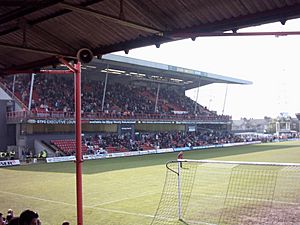
Grimsby Town plays its home games at Blundell Park in Cleethorpes. This is the club's fourth stadium. They first played at Clee Park, then Lovett Street, before returning to Clee Park. The Mariners then moved to Abbey Park until 1899, when they moved to Blundell Park, their current home.
In 1953, the club added its first floodlights, allowing night games. Taller floodlights were bought second-hand in 1958 and installed in 1960. These lights have been used ever since. However, in 2019, these old lights were replaced with new, brighter ones. Three of the four original tall poles are still there.
The stadium now has seats for 8,777 fans. Before 1995, when all seats were added, it could hold around 27,000 people. When the club moved down divisions, some extra seating was removed. This brought the total capacity down from about 12,000 to what it is today. Inside the Findus Stand, there is a special room called "McMenemy's Function Suite," named after former manager Lawrie McMenemy.
Since the late 1990s, there have been plans for a new 20,200-seat stadium in Great Coates. It was planned to be called the Conoco Stadium. There have been many delays in building the new stadium. One big problem was showing how the club would pay for it. They later added plans for a shopping area to help fund the stadium. This caused other issues with a rival plan for a shopping area.
As of the 2012–13 season, the 'Mariners Trust', which is a group of supporters, took over running most of the bars at the stadium. This helps improve things for fans.
New plans have been agreed to move the club to land near Peaks Parkway in Grimsby. As of 2020, new plans have been approved to build the stadium on land off Freeman Street.
Rivalries
| Club | Last Match | Season |
|---|---|---|
| Scunthorpe United | L 3–0 | 2020–21 |
| Hull City | L 3–0 | 2020–21 |
| Doncaster Rovers | W 2–1 | 2024–25 |
| Lincoln City | L 1–2 | 2024–25 |
| Boston United | W 6–0 | 2006–07 |
| Barnsley | W 6–1 | 2003–04 |
| Rotherham United | L 2–1 | 2009–10 |
| Sheffield Wednesday | W 2–0 | 2003–04 |
| Sheffield United | L 4–2 | 2016–17 |
Grimsby Town has several local rivals. Traditionally, Hull City, located across the Humber Estuary, was seen as Grimsby’s main rival. However, because the teams have been in different leagues, they have not played each other much recently. Their last league game was in 1987.
Scunthorpe United is Grimsby’s closest professional neighbour. They are now generally seen as the main rival. While Scunthorpe used to play in lower divisions, Grimsby's decline and Scunthorpe's rise in the 2000s changed this. Games between Hull, Scunthorpe, and Grimsby are often called the Humber derby.
Lincoln City also provides a local derby, known as the Lincolnshire derby. However, this rivalry is not as strong for Grimsby fans. Many Lincoln fans see Grimsby as their main rival, but Grimsby fans do not always feel the same way. These two clubs have also often been in different divisions for long periods.
Because Grimsby spent a lot of time in the second division, many fans see clubs like Sheffield United, Sheffield Wednesday, and Barnsley as more traditional rivals. Grimsby also has smaller historical rivalries with Doncaster Rovers and Rotherham United when they are in the same league.
Within the area of North East Lincolnshire, non-league teams like Grimsby Borough and Cleethorpes Town sometimes play Grimsby Town in friendly games or local cup competitions. However, these games are not as intense as the professional rivalries.
Mascot
The Mighty Mariner is Grimsby Town's mascot. He wears the club's home kit. He usually walks around in front of the Pontoon Stand and teases the fans of the other team. He also plays football with other mascots and helps warm up the Grimsby Town fans. Until 1998, there were two mascots, Mighty and Mini Mariner. They used to wear yellow fishing raincoats. Mini was later removed, and Mighty started wearing the home kit. Before that, the mascot was a character named "Harry Haddock", named after Grimsby's fishing industry. Harry Haddock is actually a rainbow trout.
Supporters
The Mariners Trust is a group of supporters who work with the fans and the club. They aim to make the match day experience better for everyone. They have a Junior Mariners section for younger fans. The Trust is run by volunteers and has over 400 members.
Since the late 1990s, Grimsby Town has had a group of supporters in Scandinavia, based in Norway and Sweden. Since 2006, Mariners fans have also had a friendship with supporters of the Belgian club Eendracht Aalst.
Actor and comedian Sacha Baron Cohen, famous for characters like Ali G and Borat, was seen at a Grimsby Town home game in the 2013–14 season. He watched the game and then talked to fans in a Grimsby shirt and hat. Cohen was in the town to get ideas for a new film. In December 2013, it was announced that Cohen would be in a new film called Grimsby.
Other famous Mariners fans include Soccer AM presenter and comedian Lloyd Griffith. American actor and TV presenter Adam Richman, known from Man v. Food, is also a supporter. Even though he is not from Grimsby or England, he supports the club. In 2015, Richman helped with a fan fundraiser called "Operation Promotion." In June 2020, he became a club shareholder.
Grimsby-born actor Thomas Turgoose, who starred in the film This Is England, is a season ticket holder. He appeared on the Sky show Soccer AM in 2007 wearing a Grimsby Town shirt.
Other famous fans include politician Norman Lamont, former professional snooker players Mike Hallett and Dean Reynolds, singer and songwriter Ella Henderson, and BBC weather presenter Keeley Donovan.
Grimsby Town Women
In May 2019, Grimsby Town announced they would start their first official women's team. Trials were held at the academy's training ground. The 2019–20 season saw the team join the Lincolnshire Women's League, which was the 7th level of women's football. Their first league game was against Appleby Frodingham Ladies.
The 2019–20 season was cut short in March 2020 due to the COVID-19 pandemic. Grimsby Town Women remained undefeated. They also reached the League Cup final and the Lincolnshire Women's County Cup final, but these games were not played because of the pandemic.
In the summer of 2020, the FA announced changes to the leagues. Grimsby Town Women were promoted to the 6th level of women's football. This meant they started the 2020–21 season in the East Midlands Women's Regional Football League, Division 1 North. The 2020–21 season also saw Grimsby Town Women enter The FA Women's Cup for the very first time.
Grimsby Town Women started the 2021–22 season well and led the league. In November of that season, manager Dale Houlston resigned. Hayley Cox was named the new manager. By the end of the season, they finished second in the league.
The 2022–23 season was also successful for Grimsby Town Women. They won the league title and were promoted to the East Midland's Premier Division.
After promotion, Grimsby Town Ladies played tougher teams in the 2023–24 season and were relegated. However, they did win a trophy, the Marsh Sports County Plate, with a 10–0 victory over HBW United Ladies. At the end of the season, the club parted ways with manager Hayley Cox.
On August 23, 2024, Ben Challen was appointed as the new Women's First Team Head Coach. He had been in charge temporarily since June. He stepped down from the role in April 2025 to focus on his work with the Emerging Talent Centre at the club.
Ben Thomas took over as Women's First Team Head Coach on June 11, 2025. He had previously been the Assistant Head Coach.
Players
Current Squad
|
|
Academy Squad
|
|
Club Officials
Board and Management
|
Coaching and Support Staff |
Managerial History
Managers
|
Assistant Managers |
Chairmen
| Year | Chairman |
|---|---|
| 1878–1885 | |
| 1885 | |
| 1885–1889 | |
| 1889 | |
| 1894–1896 | |
| 1896–1900 | |
| 1900 | |
| 1901–1903 | |
| 1905–1906 | |
| 1906–1908 | |
| 1908–1920 | |
| 1920–1923 | |
| 1928–1931 | |
| 1931–1954 | |
| 1954–1968 | |
| 1968–1969 | |
| 1969 | |
| 1969–1979 | |
| 1979–1985 | |
| 1985 | |
| 1985 | |
| 1985–1987 | |
| 1987–1994 | |
| 1994–1999 | |
| 1999–2001 | |
| 2001–2004 | |
| 2004–2011 | |
| 2011–2020 | |
| 2020–2021 | |
| 2021–2024 | |
| 2024– |
Notable Former Players and Managers
| Person | Grimsby record | Claim to fame |
|---|---|---|
| Manager, 1954 | Became the first foreign manager in English football with Grimsby. | |
| Player, 1926–1938 (427 games, 76 goals) | 1 England cap. A small road in Grimsby is named after him. | |
| Player, 1930–1947 (296 games, 10 goals) | 1 England cap. | |
| Player, 1989–1991 (69 games, 9 goals) | Won the European Cup twice with Nottingham Forest. Also played for Manchester United. | |
| Player, 1996–2001 (141 games, 8 goals) | Won the League Cup with Luton Town in 1988. Played for Northern Ireland 30 times. | |
| Player, 1995–96 (22 games, 4 goals) | Played in Italy's top league, Serie A, for teams like Juventus. | |
| Manager, 1988–1994, 1997–2000, 2006–2008 | The club's most successful manager. Won 3 promotions and 1 cup, including the Wembley Double in 1997–98. | |
| Player, 1999–2003 (181 games) | Welsh international goalkeeper with 11 caps. Later played in the Premier League. | |
| Player, 1992–1996 & 2005–2007 (248 games, 4 goals) | Was the club's record sale when he moved to Blackburn Rovers for £1.6 million in 1996. | |
| Player, 1975–1986 & 1991–94 (423 games, 58 goals) | Holds the record for most games played by an outfield player in the English league (931). Youngest player to play for the club at 16 years old. | |
| Player, 1937–1938 (12 games, 3 goals) | Played for Scotland 20 times, scoring 23 goals. | |
| Player, 1929–1938 (227 games, 180 goals) | Welsh international striker. Holds club records for most league goals in a career (180) and in a season (42). | |
| Player, 1992–1996 & 1997–2004 (377 games, 71 goals) Manager, 2001–2004 |
Captain of the Wembley Double-winning team in the 1997–98 season. | |
| Player (loan), 2016-2017 (7 games) | England goalkeeper with 2 caps. | |
| Player, 2001–2004 (63 games, 18 goals) | Scored a winning goal from 35 yards against Liverpool at Anfield. | |
| Player, 1987–2007 (647 games, 10 goals) | The club's all-time record holder for most appearances with 755 games. | |
| Manager 1971–1973 | Managed Southampton when they won the FA Cup in 1976. | |
| Player, 1991–1997 (187 games, 64 goals) | A popular player who scored a hat-trick in a play-off final for Charlton Athletic. | |
| Player, 2000–2001 (17 games, 5 goals) | Won the Danish Cup in 1997. | |
| Player, 1996–1997 & 2002–2003 (42 games, 10 goals) | Played international football for Wales. Was the club's record sale at £2 million in 1997. | |
| Player, 2004–2007 (104 games, 23 goals) | The only Grimsby player to be named in the PFA Team of the Year. | |
| Manager, 1951–1953 | Famous Liverpool Manager (1959–1974). Won 3 league titles, 2 FA Cups, and 1 UEFA Cup. | |
| Player, 1962–1968 (189 games, 2 goals) | Manager of the England national team from 1990–93. | |
| Player, 1932–1952 (347 games) Caretaker Manager 1950–51 |
1 England cap. | |
| Manager, 1954–1955 | Played international football for four different teams. | |
| Player, 2000–2001 (17 games, 3 goals) | Was the captain of the China national team, playing 68 times. |
Club Records
Cup Records
- Best FA Cup performance: Semi-finals, 1938–39
- Best League Cup performance: Quarter-finals, 1979–80 (replay)
- Best League Trophy performance: Champions, 1997–98
- Best FA Trophy performance: Runners-up, 2012–13, 2015–16
Games
- Biggest League home crowd: 26,605 vs. Stockport County, April 11, 1952
- Biggest FA Cup crowd: 31,651 vs. Wolverhampton Wanderers, February 20, 1937
- Biggest League Cup crowd: 23,115 vs. Wolverhampton Wanderers, December 4, 1979
- Biggest neutral venue crowd: 76,972 vs. Wolverhampton Wanderers, March 25, 1939, FA Cup semi-final at Old Trafford, Manchester
- Smallest League crowd: 1,833 vs. Brentford, May 3, 1969
- Smallest cup crowd: 248 vs. Sunderland U23's, EFL Trophy, November 8, 2017
- Biggest League home win: 8–0 vs. Tranmere Rovers, September 4, 1925
- Biggest cup defeat: 1–8 vs. Phoenix Bessemer, November 25, 1882
- Biggest League defeat: 1–9 vs. Arsenal, January 28, 1931
- Seasons spent at level 1 of the football league system: 12
- Seasons spent at level 2 of the football league system: 55
- Seasons spent at level 3 of the football league system: 28
- Seasons spent at level 4 of the football league system: 19
- Seasons spent at level 5 of the football league system: 7
Player Records
- Most League goals in a season: 42, Pat Glover (1933–34)
- Most League goals in total: 180, Pat Glover (1930–1939)
- Most League appearances: 647, John McDermott (1987–2007)
- Most appearances (all competitions): 754, John McDermott (1987–2007)
- Most capped player while at club: 7 caps, Pat Glover for Wales
- Most capped player: 68 caps, Zhang Enhua for China
- Highest transfer fee paid: £550,000 to Preston North End for Lee Ashcroft, August 11, 1998
- Highest transfer fee received: £1.5 million rising to £2 million from Everton for John Oster, August 1, 1997
- Longest serving current player: Evan Khouri since July 2019
- Youngest player: Louis Boyd, 15 years and 324 days, vs. Harrogate Town on September 8, 2020.
- Oldest player: Peter Beagrie, 40 years and 322 days, vs. Hartlepool United on September 26, 2006.
Honours
League
- Second Division (level 2)
- Champions: 1898–99, 1933–34
- Runners-up: 1928–29
- Third Division North / Third Division / Second Division (level 3)
- Champions: 1925–26, 1955–56, 1979–80
- Runners-up: 1951–52, 1961–62
- Promoted: 1990–91
- Play-off winners: 1998
- Fourth Division (level 4)
- Champions: 1971–72
- Runners-up: 1978–79, 1989–90
- National League (level 5)
- Play-off winners: 2016, 2022
- Midland League
- Champions: 1910–11, 1930–31, 1931–32, 1933–34, 1946–47
Cup
- Football League Trophy
- Winners: 1997–98
- Runners-up: 2007–08
- Football League Group Cup
- Winners: 1981–82
- FA Trophy
- Runners-up: 2012–13, 2015–16
- Lincolnshire Senior Cup
- Winners (39): 1885–86, 1888–89, 1896–97, 1898–99, 1899–1900, 1900–01, 1901–02, 1902–03, 1905–06, 1908–09, 1912–13, 1920–21, 1922–23, 1924–25, 1928–29, 1929–30, 1932–33, 1935–36, 1936–37, 1937–38, 1946–47, 1949–50, 1952–53, 1967–68, 1972–73, 1975–76, 1979–80, 1983–84, 1986–87, 1989–90, 1991–92, 1992–93, 1993–94, 1994–95, 1995–96, 1999–2000, 2011–12, 2012–13, 2014–15
See also
 In Spanish: Grimsby Town Football Club para niños
In Spanish: Grimsby Town Football Club para niños
 | Selma Burke |
 | Pauline Powell Burns |
 | Frederick J. Brown |
 | Robert Blackburn |


